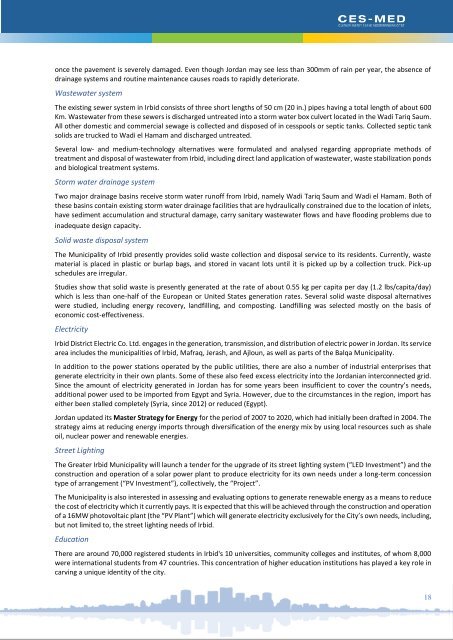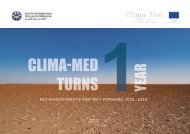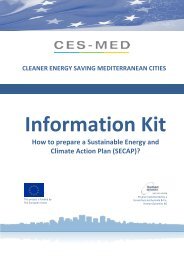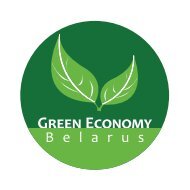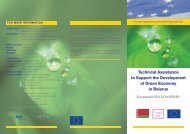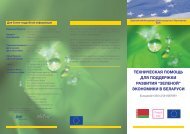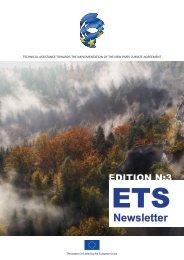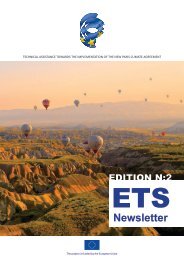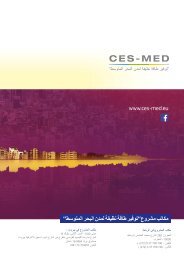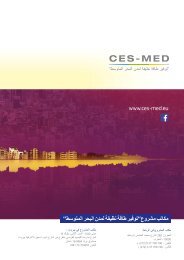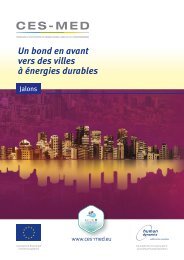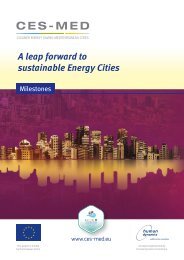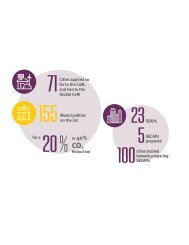171117_SECAP of Greater Irbid Municipality_SET_rev2
You also want an ePaper? Increase the reach of your titles
YUMPU automatically turns print PDFs into web optimized ePapers that Google loves.
once the pavement is severely damaged. Even though Jordan may see less than 300mm <strong>of</strong> rain per year, the absence <strong>of</strong><br />
drainage systems and routine maintenance causes roads to rapidly deteriorate.<br />
Wastewater system<br />
The existing sewer system in <strong>Irbid</strong> consists <strong>of</strong> three short lengths <strong>of</strong> 50 cm (20 in.) pipes having a total length <strong>of</strong> about 600<br />
Km. Wastewater from these sewers is discharged untreated into a storm water box culvert located in the Wadi Tariq Saum.<br />
All other domestic and commercial sewage is collected and disposed <strong>of</strong> in cesspools or septic tanks. Collected septic tank<br />
solids are trucked to Wadi el Hamam and discharged untreated.<br />
Several low- and medium-technology alternatives were formulated and analysed regarding appropriate methods <strong>of</strong><br />
treatment and disposal <strong>of</strong> wastewater from <strong>Irbid</strong>, including direct land application <strong>of</strong> wastewater, waste stabilization ponds<br />
and biological treatment systems.<br />
Storm water drainage system<br />
Two major drainage basins receive storm water run<strong>of</strong>f from <strong>Irbid</strong>, namely Wadi Tariq Saum and Wadi el Hamam. Both <strong>of</strong><br />
these basins contain existing storm water drainage facilities that are hydraulically constrained due to the location <strong>of</strong> inlets,<br />
have sediment accumulation and structural damage, carry sanitary wastewater flows and have flooding problems due to<br />
inadequate design capacity.<br />
Solid waste disposal system<br />
The <strong>Municipality</strong> <strong>of</strong> <strong>Irbid</strong> presently provides solid waste collection and disposal service to its residents. Currently, waste<br />
material is placed in plastic or burlap bags, and stored in vacant lots until it is picked up by a collection truck. Pick-up<br />
schedules are irregular.<br />
Studies show that solid waste is presently generated at the rate <strong>of</strong> about 0.55 kg per capita per day (1.2 lbs/capita/day)<br />
which is less than one-half <strong>of</strong> the European or United States generation rates. Several solid waste disposal alternatives<br />
were studied, including energy recovery, landfilling, and composting. Landfilling was selected mostly on the basis <strong>of</strong><br />
economic cost-effectiveness.<br />
Electricity<br />
<strong>Irbid</strong> District Electric Co. Ltd. engages in the generation, transmission, and distribution <strong>of</strong> electric power in Jordan. Its service<br />
area includes the municipalities <strong>of</strong> <strong>Irbid</strong>, Mafraq, Jerash, and Ajloun, as well as parts <strong>of</strong> the Balqa <strong>Municipality</strong>.<br />
In addition to the power stations operated by the public utilities, there are also a number <strong>of</strong> industrial enterprises that<br />
generate electricity in their own plants. Some <strong>of</strong> these also feed excess electricity into the Jordanian interconnected grid.<br />
Since the amount <strong>of</strong> electricity generated in Jordan has for some years been insufficient to cover the country’s needs,<br />
additional power used to be imported from Egypt and Syria. However, due to the circumstances in the region, import has<br />
either been stalled completely (Syria, since 2012) or reduced (Egypt).<br />
Jordan updated its Master Strategy for Energy for the period <strong>of</strong> 2007 to 2020, which had initially been drafted in 2004. The<br />
strategy aims at reducing energy imports through diversification <strong>of</strong> the energy mix by using local resources such as shale<br />
oil, nuclear power and renewable energies.<br />
Street Lighting<br />
The <strong>Greater</strong> <strong>Irbid</strong> <strong>Municipality</strong> will launch a tender for the upgrade <strong>of</strong> its street lighting system (“LED Investment”) and the<br />
construction and operation <strong>of</strong> a solar power plant to produce electricity for its own needs under a long-term concession<br />
type <strong>of</strong> arrangement (“PV Investment”), collectively, the “Project”.<br />
The <strong>Municipality</strong> is also interested in assessing and evaluating options to generate renewable energy as a means to reduce<br />
the cost <strong>of</strong> electricity which it currently pays. It is expected that this will be achieved through the construction and operation<br />
<strong>of</strong> a 16MW photovoltaic plant (the “PV Plant”) which will generate electricity exclusively for the City’s own needs, including,<br />
but not limited to, the street lighting needs <strong>of</strong> <strong>Irbid</strong>.<br />
Education<br />
There are around 70,000 registered students in <strong>Irbid</strong>'s 10 universities, community colleges and institutes, <strong>of</strong> whom 8,000<br />
were international students from 47 countries. This concentration <strong>of</strong> higher education institutions has played a key role in<br />
carving a unique identity <strong>of</strong> the city.<br />
18


